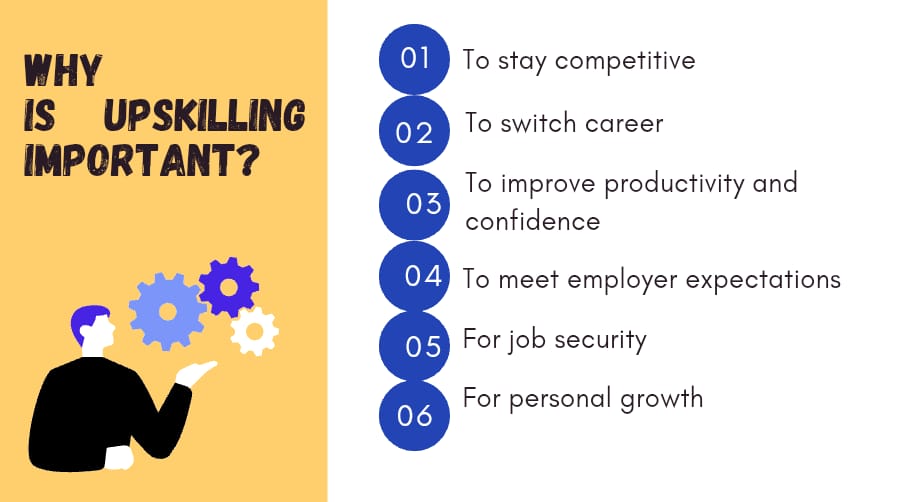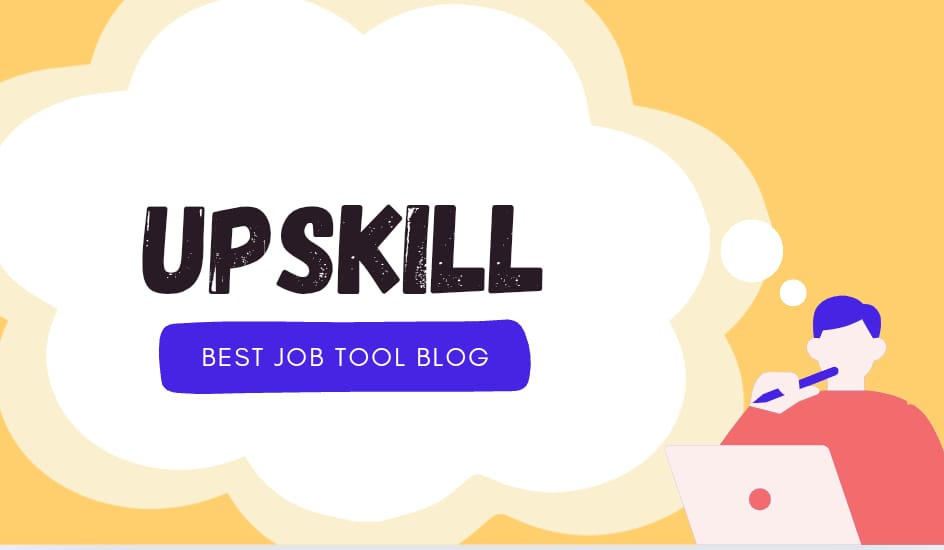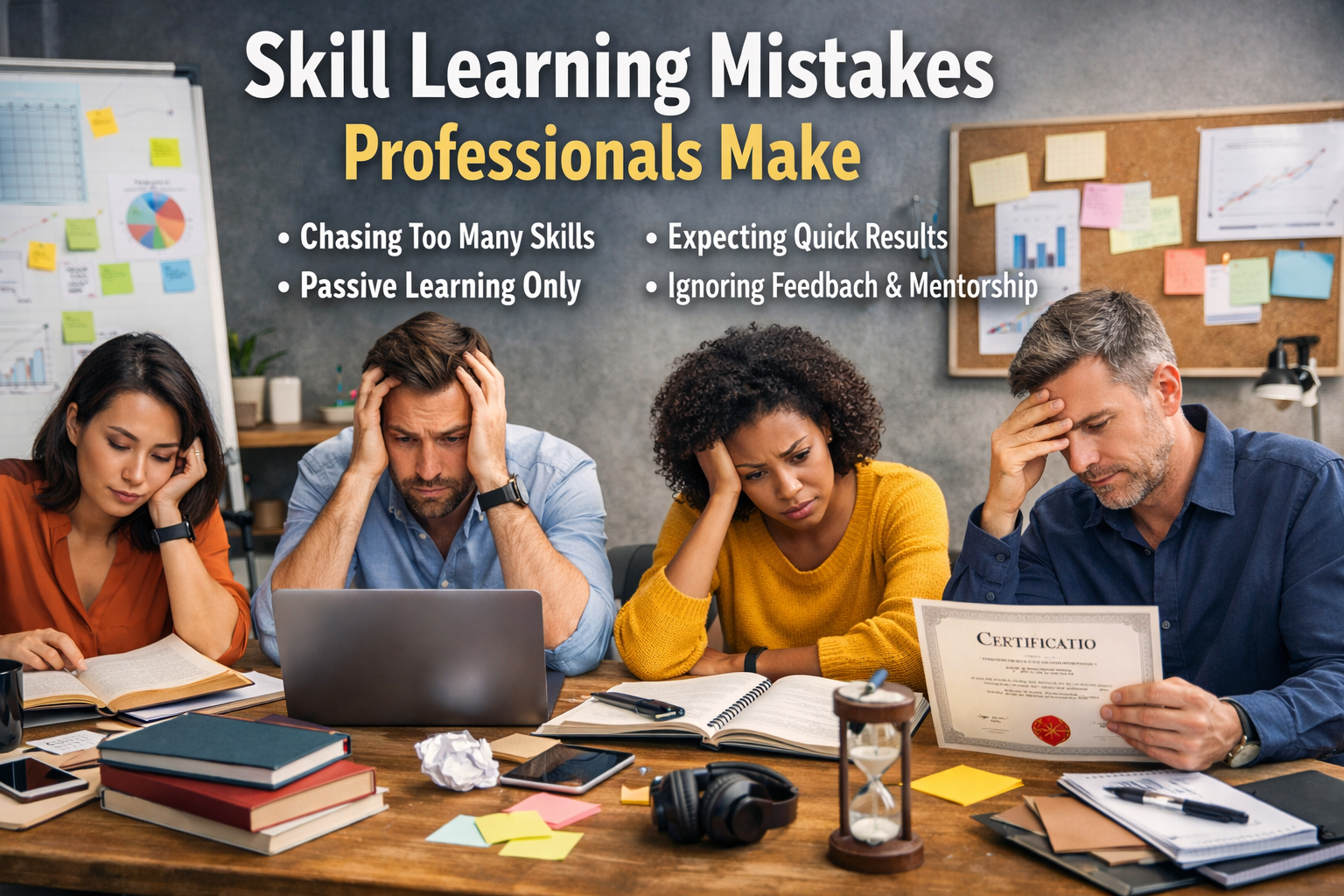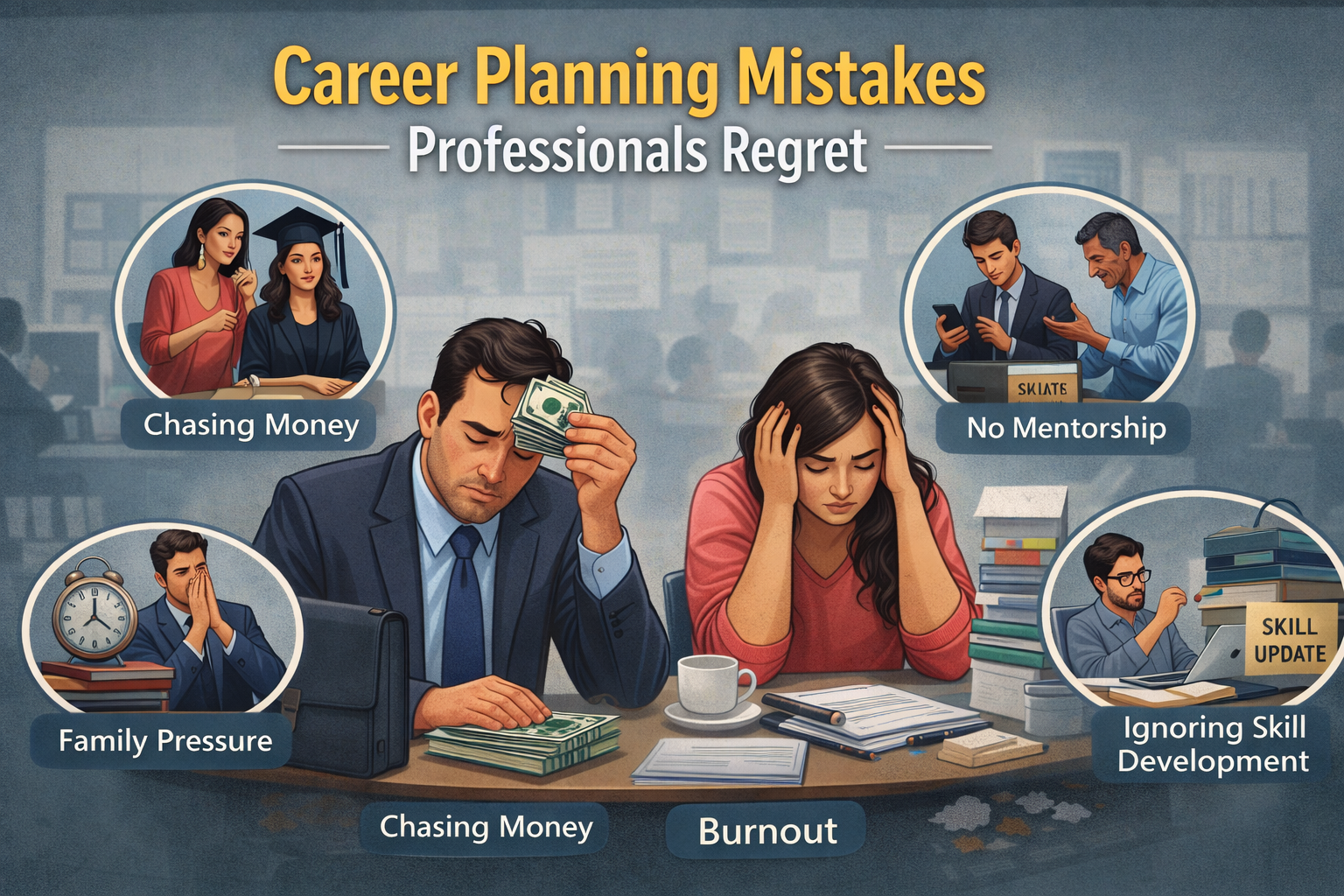Introduction
In today’s time, the world is growing at a fast pace. Every day new tools, AI-based systems, and modern technology are being launched that are changing the way of work completely. If we do not update our skills then we can be left out in our career. Upskilling means improving our existing skills and learning new skills which helps in the professional growth.
It has become a necessity in today’s job market because companies want employees who have adaptability and a learning attitude.
We have brought a very informative blog on upskilling. If you want to know in depth about upskilling, then what are you waiting for? Just dive in this article.
To read the summary of this article, click here.
Why Upskilling Matters?

Upskilling is not just about adding new abilities to your resume—it’s about staying relevant, competitive, and confident in a fast-changing job market. By clearly identifying your dream job, analyzing skill gaps, choosing the right mix of hard and soft skills, and using modern learning methods, you can strategically prepare for career success.
Leveraging technology, networking with industry professionals, and applying your skills through freelance projects or side hustles can accelerate your growth. The key is to keep learning continuously and adapting to emerging trends. When you actively invest in your personal and professional growth, you move closer to your dream job every day.
1. Upskilling To Stay Competitive in the Job Market.
Competition is high in today’s job market. Talented people are present in every field and if you do not update yourself then another person will move forward and can grab your opportunity. Upskill give us chance to learn new trends and tools.
For example, if you are a writer and learn SEO, AI writing tools, or content strategy then your profile would be very strong in comparison to a normal writer.
2. Upskilling To Switch Careers or Adapt to New Roles.
Many people want to change their field, like a teacher wants to become a digital marketer or a writer wants to become a content strategist. But without learning any skills it is not possible. Upskilling provides a smooth transition because it gives a chance to learn new industry tools, knowledge, and working style.
3. Upskilling To Improve Productivity and Confidence.
When you learn new tools and techniques then your working way becomes smart. You can automate repetitive tasks and spend more time on creative work.
You get confidence when you know that you are updated in your field and you have knowledge that others might not have.
4. Upskilling To Meet Employer Expectations for Multi-Skilled Candidates.
Now companies want employees who can handle more than one role. Earlier writers used to only right, but now companies want writers to do SEO, keyword research, and social media marketing. Like this, if a designer learn to use platforms like Canva or AI tools then their demand will be doubled in the market.
Upskilling makes you a multi-skilled professional which means you can handle multiple responsibilities efficiently at one time.
5. Upskilling For Job Security and Stability
Traditional Jobs have ended because of automation and AI. But it doesn’t mean that opportunities are fewer. Opportunities have just shifted for those people who want to learn new skills. You can secure your job through upskilling because when you have multiple skills, then the company sees you as an asset not as a replaceable employee.
6. Upskilling For Personal Growth And Future Readiness
Upskilling is important for both professional growth as well as personal development. When you learn new skills then your thinking style changes. You developed curiosity, adaptability, and a learning mindset. These qualities make you ready for future challenges.
How to Up-skill Effectively?
1. Choosing the Right Skills to Learn
When selecting skills to learn, focus on those that align with your dream job’s requirements and your personal strengths. Maintain a balance between hard skills (technical, job-specific abilities) and soft skills (communication, problem-solving, teamwork). Research industry trends to identify which skills are in high demand now and in the future. Prioritize learning skills that will have the most impact on your employability and career growth. Continuously update your skills to stay competitive in the evolving job market.
Hard skills vs soft skills for your chosen career
| Basis | Hard Skills | Soft Skills |
| Definition | These are technical, measurable skills, which you learn by through training, courses, or from direct work experience. | These are personal traits and interpersonal abilities. It defines by your style of work and interaction with someone. |
| Examples | Coding, Graphic Design, Data Analysis, SEO, Accounting, Foreign Languages. | Communication, Problem-Solving, Time Management, Teamwork, Leadership, Emotional Intelligence. |
| Importance | Hard skills are directly job-related and are clearly mentioned in job descriptions. Recruiters can verify them through tests, assignments, or certifications. | Soft skills help you adapt, collaborate, and work efficiently. They are in demand in every industry, whether the role is technical or non-technical. |
Both the hard skills and the soft skills are equally important for our career growth.
Emerging skills in 2025 job market
In 2025, job market is changing rapidly because of the AI, automation, and remote work trend. Some skills demand are growing day by day such as;
a) Technology & Data Skills
- AI & Machine Learning Basics
- Data Analytics & Visualization
- Cybersecurity Awareness
- Cloud Computing
- Automation Tools (Zapier, Power Automate)
b) Digital Communication Skills
- Remote Collaboration Tools (Notion, Trello, Slack) ka use
- Social Media Management
- Online Presentation and Public Speaking
c) Creative & Problem-Solving Skills
- Design Thinking
- Creative Content Creation
- Critical Thinking & Decision Making
2. Learning Methods for Upskilling
Now there are multiple methods for upskilling, candidates have variety of choices of tools and platforms. They can learn skills from the platform, which makes them comfortable. There are also many courses available.
Online courses, certifications, and workshops.
- Online course
With platforms like Coursera, Udemy, LinkedIn Learning, and Skillshare, you can learn skills anytime and anywhere. Here you can find courses from beginner to experience level. - Certification
A certificate from recognized institutions adds value to your profile. Like a Google Analytics certificate or a Microsoft Excel certificate, prove your expertise. - Workshop
Workshops are short-term interactive sessions where you can directly learn practical skills from experts. It’s also very useful for networking.
On-the-job learning and volunteering.
Learning new skills while doing your current job — such as shadowing a senior, working on cross-department projects, or experimenting with new tools.
Volunteering: Taking unpaid roles or community projects in your field of interest, which helps you gain real-world experience and apply your skills practically. It also strengthens your portfolio and network.
Benefit: Real-world application of skills, practical exposure, and building industry connections — without always spending money on formal training.
3. Using Technology to Upskill Faster
In today’s time, technology boost the speed of learning. AI tools, ChatGPT, Grammerly, and Canva like tools help to improve content, generate creative ideas, and help in understanding concept easily. Upskilling has very easy with technology.
AI tools, learning apps, and skill-building platforms
In today’s time, technology can boost your learning speed.
- AI tools
With the help of ChatGPT, Grammarly, and the Canva tool, we can improve writing, generate creative ideas, and understand concepts easily. - Learning app
Duolingo (language learning), Khan Academy (academic concepts), and Blinkist (book summaries) provide short, easy, and interactive learning. - Skill-building platform
On Coursera, Udemy, LinkedIn Learning, and Skillshare platforms, we can learn directly from experts, at our own pace, anytime and anywhere.
By using tech tools, you can make your learning process personalized and faster, which will help you prepare for your dream job more quickly.
Conclusion
In this article, we explored why upskilling has become a necessity in today’s rapidly evolving job market. From staying competitive and switching careers to improving confidence, productivity, and job security — every professional needs to continuously learn and adapt to remain relevant.
We also discussed how being multi-skilled not only increases your value in the eyes of employers but also helps you handle new responsibilities with ease. Upskilling isn’t just about career growth — it’s also about personal development, self-confidence, and future readiness.
This article will help you understand that learning new skills is not a one-time effort but a continuous journey. By investing time in your learning, you open doors to better opportunities, greater stability, and long-term success in 2025 and beyond.
You can read my detailed article on Networking Strategies for Job Seekers to learn how building the right connections can complement your upskilling journey.
Explore more informational blogs here.







Leave a Reply